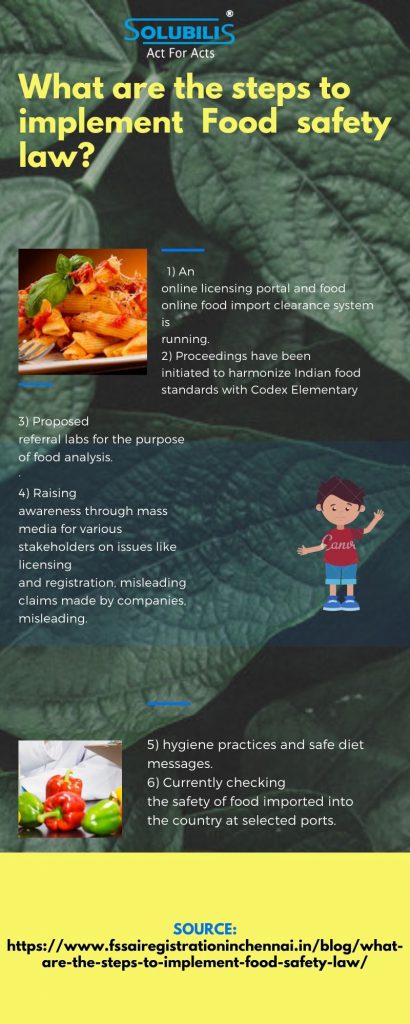What are the steps to implement Food safety law?

TALK TO EXPERTS
The Food Safety and Standards Authority of India (FSSAI) is self-governing body. It has established under the Ministry of Health and Family Welfare. It is working for food safety and regulations in India. The FSSAI was formed under the Food Safety and Standards Act, 2006 and is responsible for promoting and protecting the health of the people in India through monitoring and regulation of food safety.
Steps taken to implement food safety law in India
The passage of the FSSA, 2006 – which formed the FSSAI – led to a shift from multi-level to one-stop control by focusing on self-compliance rather than regulatory regulation for food safety.
It introduced a uniform licensing and registration regime at the center and in the states. One of the main roles of FSSAI is to establish science-based food standards in harmony with codex standards where possible.
Many steps have taken to enforce food safety laws in India
- An online licensing portal and food online food import clearance system is running.
- Proceedings have initiated to harmonize Indian food standards with Codex Elementary.
- Proposed referral labs for the purpose of food analysis.
- Raising awareness through mass media for various stakeholders on issues like licensing and registration, misleading claims made by companies, misleading.
- Hygiene practices and safe diet messages.
- Currently checking the safety of food imported into the country at selected ports.
Government plan to cover all food business operators

Under the Food Safety and Standards (Licensing and Registration of Food Business) Regulations, 2011, the FBO is expected to obtain a license and registration under these rules.
India is a huge country and FBOs range in size from small to small with a turnover of less than Rs 12 lakh. Depending on their size in terms of production and turnover, licenses will be issued by the Centre (i.e. by FSSAI) or the concerned State Governments.
Most of the licenses and registrations are to be issued by the respective state governments. That is a challenge, and the task of sensitizing state governments will be undertaken at all levels. We will also provide them with some assistance to strengthen the food security framework in the Twelfth Five Year Plan.
Challenges faced by the authorities to implement the plan
The challenges facing the Authority are mainly threefold: improving / strengthening the structure of the Food Testing Laboratory for the full scale of licensing and registration, monitoring and surveillance purposes to be undertaken by the State Governments and harmonizing production standards with Codex wherever possible. Consumers are also important stakeholders and we are focused on making them aware of the provision of the law, its implementation and their role through various campaigns. A well-informed consumer can also help a lot in demanding safe food and spreading the message of food safety.
Expectation from the health ministry in the coming years
The Ministry of Health is aware of the importance of food safety as an important lever of the national economy. While focusing on these aspects, such as having an independent regulatory body like FSSAI will lead to focused action. During the Twelfth Five Year Plan, the Ministry will seek to provide the necessary funding to FSSAI to strengthen the implementation framework in each state, create strong oversight, improve the structure of the Food Safety Laboratory, and focus on capacity building of partners. Communication and awareness in the Food Safety Regulatory Network to help consumers / FBOs / other stakeholders make informed choices.
Types of Food business Operators
Manufacturers
This will include activities related to the production of food products to any manufacturer.
Fast food joints
Any joint that serves fast food must obtain FSSAI registration. This form of registration is mandatory regardless of whether the food joint is small or small.
Hotels
Any hotel that has a restaurant rent must secure this license. Whether the hotel is large or small, this compliance is mandatory.

Banquet Holes
Banquet halls and marriage hollows only deal in serving food. However, before serving food, it has handled. Handling should have included in any process related to food. FSSAI registration is therefore have requirement for banquets and marriage halls.
Import and export homes
Any organizations dealing with the import and export of food products must secure FSSAI registration. In addition to the FSSAI license, the organization must also issue a valid ICC License (Import-Export Code) license.
Airports
Rest Restaurants are present at rents and eateries airports, so in order to comply with quality standards, airports must also ensure compliance under FSSAI.
Plane
Any airline or airline company will have to secure this license, as meals have prepared and served during the flight.
Storage houses
Any organization that stores meat-based products and other food products must comply with the FSSAI licensing requirements.
Objectives of FSSAI registration
The main objectives of FSSAI registration are as follows.
- Adherence to food quality and safety standards.
- To ensure that raw materials and other products adhere to the benchmark on quality.
- To reduce any kind of adulteration and quality of food.
- Adherence to standards of transparency and governance of food products.
- To increase consumer confidence in dealing with food products.
Recent News

- Packaged food companies said the Food Safety and Standards Authority’s (FSSAI) move to reduce trans-fats by 2% in edible oils using edible oils is consumer-friendly and most companies already do not burden the industry. Most of the food companies are already moving towards zero trans-fat. It is a pro-consumer and pro-industry move, ”said Mayank Shah, Head, Senior Category, Parle Products. Within weeks of tightening oil and fat standards, the FSSAI has imposed a cap on trans-fatty acids in food products.
- The Central Government has directed the Food Safety and Standards Authority of India (FSSAI), the main regulatory authority for food safety in India, to give it more powers, expand its jurisdiction over animal feed, improve penalties for violations and simplify procedures. The Ministry of Health and Family Welfare enacted the Food Safety and Standards (Amendment) Bill 2020 to improve the functioning of the FSSAI and its jurisdiction, and introduced 70 amendments to the 2006 Act. With this amendment, the government has proposed to bring regulation of animal feed industry under FSSAI. So far, the regulatory body has authority over the food industry.

